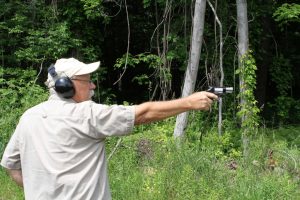
Q. My father loves three things most in life: his antique cars, his dogs, and his guns. The shooting range has been like a second home to him since mom died. It’s the place he gathers with buddies to socialize and let off steam.
Dad is now 73, and is receiving treatment for Parkinson’s disease. His memory is starting to fade, as well, and the doctor recently told us that dad has dementia. With his health concerns, we face a wrenching, emotionally charged question: When is the right time to confront him about giving up his guns?
Up until now, my brother and I have avoided broaching the topic with dad, though it’s only a matter of time until his physical and mental abilities are likely to decline further. How can you tell when the time is right to give up a gun, and what is the best way to have this conversation? Thanks!
A. Many of us already dread “the talk” with our parents or spouse, suggesting that they surrender their car keys. But now, another thorny question must be asked of some seniors — is it time to give up your guns?
Currently, as many as 40% of the country’s older population have firearms in the home, according to the Pew Research Center, and about 11% of people 65 and older have Alzheimer’s. With Alzheimer’s and other forms of dementia comes memory lapses and the kind of confusion that could result in a caregiver being mistaken for a menacing intruder. People with dementia can also become aggressive and hallucinate, lose their peripheral vision, fail to recognize loved ones, and forget the purpose of an object. While those in the early stages may handle a gun responsibly, the risk of trouble obviously grows as the disease progresses.
When Does Gun Ownership Become Too Dangerous?
Cognitive impairment due to Alzheimer’s disease and other forms of dementia and mental health disorders, such as depression, are the biggest red flags for families to look for when deciding if it is still safe for a loved one to own a gun.
In a paper published in the Journal of the American Geriatrics Society, two physicians offer a five-point checklist meant to help caregivers assess whether firearms remain safe in the hands and homes of older Americans, particularly if the gun owners are exhibiting unclear thinking, memory loss, or depression. The paper lists “5 Ls” to ask an older gun owner:
1. Is his or her gun “loaded?”
2. Is it “locked?”
3. Do “little” children visit the home?
4. Is the owner feeling “low?” and
5. Is the owner “learned” about proper use?
In addition to these considerations, keep in mind that confusion, memory issues, inability to recognize or remember who friends and family are, impaired decision-making capabilities, delusions, hallucinations and paranoia can all contribute to a terrible accident and must be taken into consideration.
Don’t Just Take the Gun Away—Start with a Conversation
Experts in public safety and geriatric care say that relatives often don’t know how to navigate these difficult conversations. Instead, in many cases, they are sneaking guns from the homes of loved ones with Alzheimer’s, covertly disabling pistols, and in many cases avoiding the topic altogether.
The best way to handle this situation should depend on your loved one’s level of cognition, physical health, reasons for ownership, and the nature of your relationship with the gun owner. The Alzheimer’s Association offers guidance on how to minimize risks associated with firearms in homes where a loved one has a cognitive impairment:
- Put a plan in place, just as you might plan to remove a driver’s license, car keys, or a checkbook.
- Include your father in the conversation. It could go something like this: “There is going to come a time when you can no longer handle the gun safely. How do you want us to handle this in a way that respects you?”
- Consider having a shooting range buddy be part of the discussion.
- Don’t simply remove bullets or disable the gun. Police officers will not be aware that the firearm is disabled, and they could injure anyone holding it.
- If the relative is too confused for a discussion, it may be time just to confiscate the gun. Do it while the owner is out of the house. Also remove holsters and other reminders of the gun. Ultimately, safety is the number one priority!
If discussing these concerns with your dad directly is not productive, it can be helpful to contact his physician or the local police department for guidance on ensuring the safety and the wellbeing of your dad and those around him. A police officer may be able to help confiscate the weapons. It may be difficult to attempt, but revoking a loved one’s concealed-carry license is also an option. The Alzheimer’s Association also has counselors available 24/7 at 1-800-272-3900.
Ultimately, no family member wants to infringe on a the independence of their loved ones, but at some point, we must take responsibility for their well-being and the well-being of those around them.
Medicaid Planning for Dementia
Have you struggled to discuss firearms with an aging relative? As you can see, these conversations can be challenging, but are very important. Another important conversation should be planning for long-term care. Persons with dementia and their families face special legal and financial needs. At the Farr Law Firm, we are dedicated to easing the financial and emotional burden on those suffering from dementia and their loved ones. We help protect the family’s hard-earned assets while maintaining your loved one’s comfort, dignity, and quality of life by ensuring eligibility for critical government benefits such as Medicaid and Veterans Aid and Attendance. Please call us whenever you are ready to make an appointment for a consultation:
Fairfax Elder Law: 703-691-1888
Fredericksburg Elder Law: 540-479-1435
Rockville Elder Law: 301-519-8041
DC Elder Law: 202-587-2797














Leave a comment
You must be logged in to post a comment.